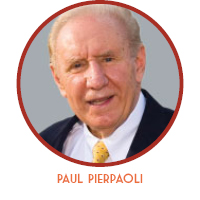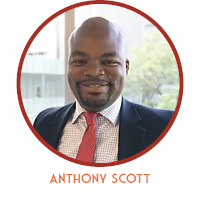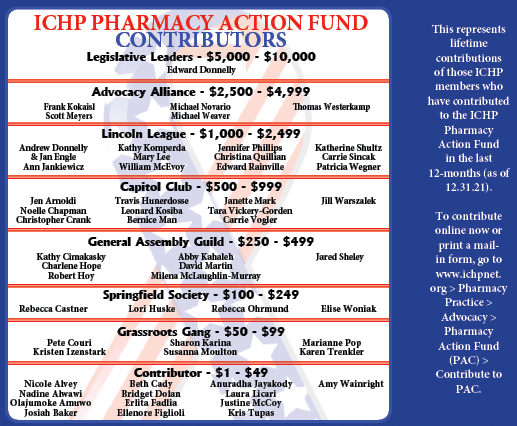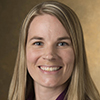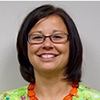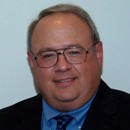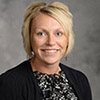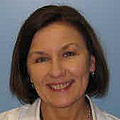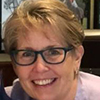Print Entire Issue
ICHP Info
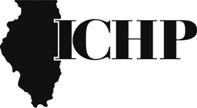
Illinois Council of Health-System Pharmacists
4055 North Perryville Road
Loves Park, IL 61111-8653
Phone: (815) 227-9292
Fax: (815) 227-9294
ichpnet.org
KeePosted
Official News journal of the Illinois Council of Health-System Pharmacists
EDITOR
Jennifer Phillips
ASSISTANT EDITOR
Milena Murray
MANAGING EDITOR
Scott Meyers
ASSISTANT MANAGING EDITOR
Trish Wegner
DESIGN EDITOR
Melissa Dyrdahl
ICHP Staff
EXECUTIVE VICE PRESIDENT
Scott Meyers
VICE PRESIDENT - PROFESSIONAL SERVICES
Trish Wegner
DIRECTOR OF OPERATIONS
Maggie Allen
INFORMATION SPECIALIST
Heidi Sunday
CUSTOMER SERVICE AND
PHARMACY TECH TOPICS™ SPECIALIST
Jo Ann Haley
ACCOUNTANT
Kim Anderson
COMMUNICATIONS MANAGER
Melissa Dyrdahl
LEGISLATIVE CONSULTANTS
Liz Brown Reeves
ICHP's Mission Statement
Advancing Excellence in
Pharmacy
ICHP's Vision Statement
ICHP dedicates itself to
achieving a vision of pharmacy practice where:
·
Pharmacists are
universally recognized as health care professionals and essential providers of
health care services.
·
Pharmacists use their
medication expertise and leadership skills to optimize the medication use
process and patient outcomes.
·
Pharmacy technicians are
trained and PTCB certified to manage the medication distribution process.
ICHP's Goal Statements
·
Raising awareness of the
critical role pharmacists fulfill in optimizing medication therapy and ensuring
medication safety in team-based, patient-centered care.
·
Providing high quality
educational services through innovative continuing pharmacy education and
training programs, and sharing evidence-based best practices.
·
Developing and nurturing
leaders through mentorship, skill development programs, and leadership
opportunities.
·
Working with national
and state legislators and policymakers to create or revise legislation and
regulation critical to pharmacy practice and quality patient care.
·
Urging pharmacy
technician employers to require successful completion of an accredited pharmacy
technician training program and PTCB certification of all pharmacy technicians.
Approved by the ICHP
Board of Directors May 30, 2018.
KeePosted Vision
As an integral publication of the Illinois Council of Health-System
Pharmacists, the KeePosted newsjournal will reflect its
mission and goals. In conjunction with those goals, KeePosted will
provide timely information that meets the changing professional and personal
needs of Illinois pharmacists and technicians, and maintain high publication
standards.
KeePosted is an official publication of, and is copyrighted by, the
Illinois Council of Health-System Pharmacists (ICHP). KeePosted is
published 4 times a year. ICHP members received KeePosted as
a member benefit. All articles published herein represent the opinions of the
authors and do not reflect the policy of the ICHP or the authors’ institutions
unless specified. Advertising inquiries can be directed to ICHP office at the
address listed above. Image disclaimer: The image used in the Pharmacy Tech
Topics™ advertisement is the property of © 2017 Thinkstock, a division of Getty
Images. Some images are property of © 2021 Adobe Stock.
Copyright © 2021, Illinois Council of Health-System Pharmacists. All rights
reserved.
ICHP Info
President's Message
Crank's Corner
Columns
ICHPeople
Government Affairs Report
Organizational Affairs
Marketing Affairs
ICHP Leadership Spotlight Interview
ICHP Leadership Spotlight Interview
New Practitioners Network
Ambulatory Care Network
PEARLS: Public Education & Awareness Outreach Publication Subcommittee
ICHP Best Practice Award
Educational Affairs
Professional Affairs
Features
2021 Member Greeting & Seven Ways to get More out of your ICHP Membership in 2021
Thank You Volunteers
Election Results
Election Results
Poison Prevention Week
Another Perspective
College Connection
Midwestern University Chicago College of Pharmacy
Rosalind Franklin University College of Pharmacy
Southern Illinois University Edwardsville School of Pharmacy
University of Illinois Chicago College of Pharmacy
More
Upcoming Events
Welcome New Members!
ICHP Pharmacy Action Fund Contributors (PAC)
2020 KeePosted Index
Board of Directors
 President's Message
President's Message
Starting With Why
by Jennifer Arnoldi, PharmD, BCPS Clinical Associate Professor, SIUE School of Pharmacy President of ICHP
In November, volunteers and leaders within ICHP met for the annual Leadership Retreat. While this year’s meeting looked different - thanks to the virtual format - it was as productive and energizing as ever. Meeting attendees prepared for the retreat by reading Start with Why by Simon Sinek.
1 For those who may be interested in a modern-day CliffsNotes of the book, you could check out Sinek’s TED talk on Youtube (
www.youtube.com/watch?v=IPYeCltXpxw).
2 The main theme of the book is that folks buy into a company or organization based on the strength of the organization’s why; that is, the driving force and passion behind the work that is done. Sinek tells us that too many organizations focus on how they do things (“we’re the best”) or what they provide (“look at all our services”). While those are all useful, relentlessly driving forward without a strong, clear why is like starting out on a road trip without directions. You’ll get somewhere, but it might not be where you intended.
During the retreat, we reminded ourselves of the why of ICHP and kept it in mind as we discussed how to build bridges with various groups: our current members, prospective members, other healthcare professionals, our patients and public, and legislators and their staff. Using breakout rooms, retreat attendees had the opportunity to weigh in on these various topics and recommend new goals and initiatives for ICHP. Many useful ideas came out of our discussions; these have been organized and distributed to the ICHP staff, all Divisions, and some Networks and Committees of ICHP to inform our strategic plan.
I think I can safely say that 2020 was a year that threw us all for a loop. If you find yourself struggling with your personal why, I’d encourage you to carve out some time to reflect. The beginning of a new year is the perfect time to do so. You might think of some reflective questions to help you find your own why or get back to the why you feel you’ve lost. Here are some questions to get you started, adapted from Find Your Why, by Simon Sinek.3
Who in your life helped make you who you are today? Write down a specific time when they exemplified what you admire most about them, whether they were interacting with you or someone else.
Think of a day when you left work and thought, “I would have done that for free.” What happened to make you say that? How could you feel that way again?
What has been a pivotal moment in your life – what happened to make you realize nothing would ever be the same again?
Describe a time when you unselfishly helped someone else; when was there a time that made you feel unbelievably good and that you did something that mattered?
If you feel comfortable doing so, share your stories with a trusted partner, friend, or colleague. Ask them to help you interpret your answers to identify some common threads in your experiences. Look for meaning that can help you find your own personal why. Then, keep your why in mind as you pursue opportunities in 2021 and beyond.
REFERENCES
- Sinek, Simon. Start with Why. Penguin Books, 2011.
- Sinek, Simon. Start With Why – TED Talk Short Edited. YouTube. Published March 3, 2014. Accessed December 13, 2020. https://www.youtube.com/watch?v=IPYeCltXpxw
- Sinek, Simon. Find Your Why. Portfolio/Penguin Books, 2017.
 Crank's Corner
Crank's Corner
Pharmacy Advocacy: Exercise Your Right to Influence the Legislative Process
by Christopher W. Crank, PharmD, MS, BCPS; ICHP Executive Vice President
I am sure many ICHP members will see the title of this column and think or feel at least one of the following:
- "I will not make a difference."
- "I do not have time for that!"
- "I do not know enough."
- "I do not know where to start."
I want to try to address some of these thoughts in this article. It is understandable that you may feel this way. I felt this way for many years before I started routinely participating in the Government Affairs Division. Through my involvement in Government Affairs and ICHP, I have learned a lot about the impact that a three-pronged approach to advocacy can have. The three prongs to successful advocacy are: the individual, the organization, and the lobbyist.
The Individual
Many people feel that government is too big to influence, or that legislators do not care. While there is some truth to this statement, it is also an overgeneralization of reality. Legislators do want to hear from their constituents. In fact, legislators have acknowledged that as few as six communications from their individual constituents can influence their opinions and votes. In addition, one expert opinion that is concise and well thought out can have an impact on the way the legislator votes. Your vote and voice have power.
Advocating for our patients and the profession of pharmacy does not have to take a lot of your time. Most legislators have websites that allow you to send them a message quickly and easily. I have found it takes about 15 minutes to compose a message. You can use communications from organizations such as ICHP as a starting point for your correspondence. Copy and paste is a wonderful function. However, add something personal or local. Tell the story of how the proposed legislation will positively or negatively affect patients, the community, pharmacists, healthcare systems, or healthcare in general. A good story or anecdote goes much further than a communication chock-full of data and technical details. You might be asking, “What about form letters from organizations? Aren’t they enough?” Most experts acknowledge form letters have some impact, but not as much as a personal communication. Legislators often view these letters as representing an organization’s goals and needs. An organization does not vote for legislators. In addition, a form letter to a legislator is often responded to as a form letter. If you do not make it local or personal, neither will the legislator.
As pharmacists and technicians, we are some of the most - if not the most - knowledgeable groups when it comes to all medication-related topics. In some ways, improving your knowledge and abilities around advocacy is just like developing skills and knowledge in a clinical practice setting. You start out not knowing as much as you need to, but with practice and experience, you become more proficient. When composing your communication, rely on your organization to provide you with the important talking points. If you do not understand them, research them, or reach out to someone for guidance. The individual has great potential to impact legislation. I encourage you to become actively engaged in the legislative process for your patients, your profession, and yourself.
The Organization
An organization on its own will have difficulty impacting the voting positions of legislators. As I mentioned earlier, organizations cannot vote. Legislators are most interested in hearing from their constituents. This does not mean organizations do not have a key role in advocacy. A large part of the advocacy role for the organization is to provide education and talking points on legislation for its members. The goal is that the members will take the information provided and let their legislators know what their stance is on the proposed legislation. In addition, organizations actively work with legislators toward improving proposed legislation.
In the upcoming year, we at ICHP will begin using social media and email blasts to communicate with you on important legislative matters. We will provide you with a summary of the proposed legislation, what it means to our patients and to the pharmacy profession, and key talking points to use with your legislators. I hope that this will help engage more of our members in advocacy efforts.
The Lobbyist
According to Merriam Webster, a lobbyist is one who conducts activities aimed at influencing or swaying public officials and especially members of a legislative body on legislation. The lobbyist is an expert on the political process and machinery. They have their ear to the ground, and they inform the organization about proposed legislation, legislators’ stances, and which legislators are in support of, opposed to, or neutral on legislation. The lobbyist attempts to persuade the legislator to propose, pass, amend, or defeat legislation and regulations. They have connections within the political system that can be used to acquire information and provide information to legislators. In addition, they can inform the organization they represent on which other organizations are in support of, opposed to, or neutral on legislation. The lobbyist is key to successful advocacy. ICHP’s lobbyist is Liz Brown-Reeves. Liz became a lobbyist for ICHP in 2019, and she does a wonderful job of keeping the Government Affairs Division and the ICHP staff informed on what is happening in Springfield.
Conclusion
Advocacy is the responsibility of the individual, the organization, and the lobbyist. When all three prongs are in sync, great things can be accomplished. I want to challenge every ICHP member to reach out to their state legislators at least twice in 2021. It comes down to this: Would you rather complain about enacted legislation that impacts your patients and your practice or advocate so that we can influence the legislation while it is being composed? I think the latter is the most effective route.
Columns
ICHPeople
Dr. Enich passed away on November 25, 2020. He was the pharmacy director of many State of Illinois mental health faciliteis before retiring in 2015. George became a member of ICHP in 2006. ICHP would like to extend our condolenses to his family.
Photo courtesy of: Tezak Funeral Home
Paul passed away on December 17, 2020. Paul was a past president of ASHP and a member of ICHP. He spent many years working in Illinois as director of pharmacy services at Rush-Presbyterian-St. Luke's Medical Center and as a professor of pharmacology at Rush Medical College. ICHP would like to extend our condolenses to his family.
Photo courtesy of: ASHP
ICHP Member, Dr. Tran Tran welcomed a sweet baby boy to her family this summer. Ellis Tran Serna was born on August 28, 2020 weighing in at 8 pounds 5 ounces. He happily joins his brood of brothers Lucas (4) and Leo (2). Congratulations, Dr. Tran and family!
Dr. Tony Scott will be leaving Illinois for a new job as the Director of Pharmacy Services for Emory University Hospital, part of a 10 hospital network located in the metro Atlanta area. Dr. Scott served as the Assistant Director of Pharmacy Operations at UChicago Medicine since July 2016 and as the RPD for the HSPA residency program for the past two years. Tony joined ICHP in 2016 and since then has served on the meeting planning committees (fall and spring), participated in leadership retreats, on professional affairs calls, was a Best Practice Award and Poster Presentation judge, and served as an ICHP networking facilitator and meeting presenter. We wish Tony the best of luck in his new position.
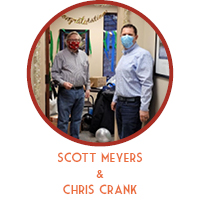
Scott - After 28 + year as ICHP's Executive Director/Executive Vice President, Scott Meyers has retired. We wish him the very best and thank him for his decades of committement to advancing escellence in Pharmacy! Check out our send-off video to Scott on youtube:
https://www.youtube.com/watch?v=31VvKYzztho&t=11s
Chris - ICHP welcomes Chris Crank as our new Executive Vice President. We are excited to welcome his new ideas and fresh perspective as we navigate the future! Feel free to reach out to him at
ChrisC@ichpnet.org.
Government Affairs Report
February 2021 Update
by Christopher W. Crank, PharmD, MS, BCPS; ICHP Executive Vice President
Due to the COVID-19 pandemic, there is not a lot of news on the legislative front. The fall veto session was cancelled. One bill of interest that was being considered for the veto session was SB3266, Facility-Provided Medications. The proposed bill would have amended the University of Illinois Hospital Act, the Ambulatory Surgical Treatment Center Act, the Hospital Licensing Act, and the Pharmacy Practice Act, which would have required hospitals, facilities, and pharmacies to offer a patient any unused portion of a facility-provided medication upon discharge when it is administered to a patient at the hospital, facility, or pharmacy and is required for continuing treatment. ICHP worked closely with the Illinois State Medical Society, the Illinois Hospital Association, and our pharmacy directors to minimize the overall workload impact of this change that would have also positively impacted many patients. The proposed bill was amended to require 24 hours advanced notice for the discharge medications. In addition, the legislation was adjusted to eliminate the requirement for pharmacist counseling on the prescriptions. The counseling requirement was placed on the ordering provider. SB3266 is one piece of legislation that we expect will return in the spring session. ICHP will keep you posted.
Organizational Affairs
Structure of ICHP
by Krista Paplaczyk, PharmD; PGY1 Pharmacy Resident; Northwestern Memorial Hospital
Are you looking for ways to become more involved with ICHP, but you are not quite sure where to start?
Understanding the branches of our organization can help you to get the most out of your membership! Contact a network or division director to get more involved.
ICHP Network: A group of members with similar professional interests formed to pursue issues pertinent to their unique needs
- New Practitioners Network, Residency Leaders Network, Ambulatory Care Network, Technician Network, Pharmacy Informatics and Technology Network, Small and Rural Hospital Network
ICHP Division: A group of members that advises, develops, and implements programs and policies authorized by the Board of Directors
- Professional Affairs, Marketing Affairs, Educational Affairs, Governmental Affairs, Organizational Affairs
ICHP Committee: A group of members that are assembled by the Board of Directors for a specific purpose
- Committee on Finance, Executive Committee, Nominations Committee, KeePosted Committee
Marketing Affairs
Greetings from Marketing Affairs
by Denise Kolanczyk, PharmD, BCPS, Associate Professor of Pharmacy Practice, Midwestern University College of Pharmacy, Downers Grove Campus; Director of Marketing Affairs
I’d like to take this time to introduce myself as the new Director of the Division of Marketing Affairs. I’ve been a member of the Division since 2015, and am excited to offer my leadership over the next 2 years.
The Division has been busy over the past year. We were able to successfully implement the Technician’s Network and create an institutional membership discount program. While the Champions program was eliminated, the continuing education offerings transitioned to CE Appetizers! Have you attended one lately? It’s a great way to learn something new over lunch with your colleagues and students.
We also increased our social media presence through monthly polls and membership spotlights. The biggest accomplishment from the past year was the creation of the public health outreach subcommittee, PEARLS (Public Education & Awareness outReach pubLication Subcommittee). A few “Did you know?” facts have been posted on social media sites with the intention of YOU sharing it with your social networks. PEARLS also wrote a letter to President-Elect Biden advising that he appoint a pharmacist to the COVID-19 Advisory Board. This was shared and retweeted by many of our members. It was also picked up by the Med Ed 101 blog, who reminded its audience that “If you don’t say something, no one will.”1 To Scott Drabant and the rest of the PEARLS subcommittee, keep up the great work!
In November, I attended the ICHP Virtual Leadership Retreat. Much of our conversation was focused on how we can promote the “why” of ICHP. We discussed why we joined, and why we continue to renew our memberships. However, we also discussed “why” some of our members don’t renew after 1 or 2 years. We even asked why some pharmacists, technicians, and students don’t become members at all. We all reflected on this, and how we can do a better job explaining the “why”.
My favorite suggestion came from one of our Past Presidents, Dr. Ann Jankiewicz. She started to tell her story of why she became a member of ICHP, and how her membership has molded her into the pharmacist and leader she is today. Her story led to a suggestion that our members should do the same.
Here’s my story: I attended pharmacy school in Indiana, and belonged to a state clinical pharmacy focused organization. I held a small leadership position as the “pharmacy resident liaison”, and was involved in business meetings and continuing education programs for the greater Indianapolis area. It took me a few years to find my home in ICHP after moving to Chicago for my first clinical pharmacy position. After obtaining a faculty position with Midwestern University College of Pharmacy in Downers Grove, I came across an email from Dr. Jennifer Philips. It was time to renew her membership, and she was looking for a new member to take advantage of the Double Dose program. I responded first – lucky me! Jen asked me to come to her office to sign the membership form. She took that as an opportunity to discuss the various ICHP divisions and networks, and asked what sparked my interest. Within a day, an email had been sent to Dr. Carrie Vogler who was leading the division at the time, and I’ve been a member ever since. I became involved in division business, and now I’m at the helm.
I also served on the executive board for one of our regional affiliates, the Northern Illinois Society of Health-System Pharmacists (NISHP). I had attended a few dinners and continuing education programs when Dr. Kathryn Schultz asked if I would run for President-Elect. I completed my 3-year term over the summer, and am grateful for the opportunity. I met pharmacists, technicians, and aspiring students from the area. I was able to plan several events with other pharmacists and technicians that kept our members interest in mind. The NISHP affiliate programming is my featured star of ICHP membership. The close knit atmosphere allows for networking and meeting new people. I look forward to when we can safely gather again.
My past would certainly look different if it weren’t for my ICHP membership. I would not have honed my leadership skills. For some of you, our paths would never have crossed. I may never had considered submitting a proposal to speak at an Annual Meeting! My ICHP membership has certainly given me the skills to become a better pharmacist, educator, and leader.
As I end this column, I ask you: Why did you get involved in ICHP? How has your involvement shaped you? I encourage you to share your stories with others when you suggest that they become an ICHP member. Publish it in your pharmacy department newsletter. Post it in the breakroom. E-mail it to the department. We need to showcase the worth of our membership – it has so much to offer.
REFERENCE
- Christianson E. If you don’t say something, no one will: advocating for pharmacy. MED ED 101 blog. December 6, 2020. Accessed December 15, 2020. https://www.meded101.com/category/advocacy/
ICHP Leadership Spotlight Interview
Meet Jason Alegro, PharmD, BCPS, BCIDP
What is your leadership position within ICHP?
I am currently the President-Elect of the Northern Illinois Society of Health-System Pharmacists (NISHP).
Describe your practice site.
I am an Assistant Professor of Clinical Sciences at Roosevelt University’s College of Pharmacy and an Infectious Diseases (ID) Clinical Pharmacy Specialist at Mount Sinai Hospital. I coordinate and teach the core ID course, advanced ID elective, and deliver various other lectures throughout the curriculum. I also serve as the Faculty Director of Graduate Preparation and co-advise our Pharmacy Student Council. At Mount Sinai, I precept APPE students on their clinical specialty rotation and PGY-1 Pharmacy Residents on their ID consult and antimicrobial stewardship rotations. I also serve as the Pharmacist Chair of our Antimicrobial Stewardship Program and practice as a Clinical Pharmacy Specialist on the inpatient ID consult team.
How would you change pharmacy if you could?
The business models of pharmacy practice clearly need to be revolutionized. With the announcement of Amazon Pharmacy and the projected oversupply of pharmacists in the next 10 years, an abundance of highly educated medication experts will need to assume new roles where they can use their clinical skills to serve a growing geriatric population. We need to leverage our niche in healthcare as providers who can make a significant positive impact on patient outcomes and develop innovative strategies to ensure this model is profitable. Navy Admiral Grace Hopper stated, “The most dangerous phrase in the language is ‘We've always done it this way.’” In this spirit, we must work as a profession to make a significant pivot now in order to keep up with the profound changes happening around us in healthcare and technology.
What pharmacy related issues keep you up at night?
The looming threat of antimicrobial resistance. An ID physician at a recent webinar best said this, “If you wanted to see what a world without antibiotics because of rampant drug resistance looks like, look no further than the current state of the COVID-19 pandemic, where our antimicrobial therapies are marginally effective at best.” Without a sustained national effort toward combating antibiotic drug resistance, we are soon to be in a post-antibiotic era. One of my goals in teaching students and residents is to charge them with the responsibility of being an antibiotic steward - wherever they end up practicing - because it is not just ID-trained pharmacists and physicians who will need to play a role to curb these antibiotic resistance threats.
What makes ICHP great?
ICHP is great because it is full of supportive, motivated, and energetic pharmacists, technicians, and students I look to for inspiration and collaboration. These colleagues - who exemplify what transformative leadership is all about - have helped me to grow and learn so much as a new practitioner.
What initially motivated you to get involved in ICHP?
I was involved in ICHP sporadically as a student, but I didn’t get involved as a pharmacist until I was a few years into my position at Roosevelt. Dr. Milena Murray reached out to me to join to the Educational Affairs Division of ICHP after I delivered a presentation at Midwestern, and she really sold the benefits of joining! Since then, I’ve looked up to Milena as a great colleague and mentor who inspired me to write a KeePosted article, help plan the virtual annual meeting, and get more involved with a leadership role in NISHP. To those looking to get more involved with ICHP, it is mentors like Milena and so many others that empower you to become a better version of yourself and that make this a great organization.
Is there an individual you admire or look up to, or a mentor that has influenced your career?
Dr. Sheila Wang from Midwestern University inspired me to pursue a specialty in Infectious Diseases and a career in academia. The subject of ID intrigued me, but it was the way that Sheila taught and showed her passion, empathy, and commitment as a professor that lit a fire in me to follow a similar route. She both challenged and cared for us as students, and the example she set as a leader both inside and outside of the classroom is something for which I strive in my career. I cannot thank Sheila enough for being such a huge influence on me!
Prior to my pursuit of a residency, I was on track to take a job in community pharmacy, with the vision of working for a few years, paying off student loans, and then circling back around to eventually seek a career in ID. I ended up speaking to Dr. Marc Scheetz during the ASHP Midyear of my P4 year, and I told him about my plan. He very bluntly told me that although this is a plan that might work for some, that if I was truly committed to pursuing ID in my career, I needed to apply for residency this year. Suffice it to say, I started writing my letters of intent on the plane back home from the meeting, and the rest, as they say, is history. Thanks for showing me the way at such a pivotal time, Marc!
What advice would you give to student pharmacists?
- When you are experiencing a difficult or less-than-ideal situation in your pharmacy career, just think, “This will be a great answer to a tough interview question.” It really helps give perspective and frame your current circumstance in a more positive or at least a neutral light.
- Be prepared for anything. You can do this by learning as much as you can, showing up, working hard, and staying humble. Nobody knew what to expect when COVID-19 hit, so the only way to be prepared for something like this was to consistently be on top of your game, work with each other, and prepare for the worst. In the words of a famous House, “Winter is Coming.”
- Don’t forget why you got into healthcare. The late nights studying, the investment of your precious time and money into this career, and the reason you are working so hard is so that you can best serve and care for your patients.
What is your favorite restaurant or food? I don’t think that I can ever say no to Chipotle. Even amidst the E. coli outbreaks a few years ago, I was willing to take my chances on a steak bowl. The guacamole and ciprofloxacin cost extra.
Where is your favorite place to vacation? I really loved Amsterdam. The beautiful canals, historic museums, friendly people, bicycle culture, and just overall unique and chill vibes made this such an incredible place to go on holiday.
ICHP Leadership Spotlight Interview
Meet Kayla DuBois, PharmD, BCPS, MBA
What is your leadership position within ICHP?
I am the Sangamiss Chapter President Elect. My main responsibilities in this role include organizing and hosting the monthly Sangamiss CPE presentations.
Where is your practice site?
I am currently at Clinical Pharmacist at Memorial Medical Center in Springfield, IL.
Tell us about a time when you made a difference in patient care.
During one of my shifts, I had a patient with severe malaria who was not responding to standards of care. The ICU physician was requesting a non-formulary agent available only from the CDC under an Emergency Use Authorization. I coordinated the attainment of this drug, and was able to be the primary contact for this process from the time the CDC was contacted until when the drug was administered at the bedside. There were several unexpected challenges in this process, including the patient being placed on CRRT. As the facilitator, I streamlined the information and recommendations from all involved parties and helped develop the final plan to safely administer this life saving drug. I was able to witness the impact of my efforts firsthand, which was an amazing experience.
Tell us a story about how you selected pharmacy as your profession.
I first decided to become a pharmacist when I was in middle school. A few of our family friends were pharmacists, and after talking with them, I was convinced that I wanted to become a pharmacist as well. At that point in my life, I only cared about helping people. When I really think about my career, this has stood the test of time. The most fulfilling aspect of being a pharmacist is knowing that I help my patients each day. Especially during the global health crisis we are currently facing with COVID-19, I am so grateful that I have this opportunity to make an impact.
What makes ICHP great?
ICHP is a great organization because it unites health-system pharmacists across the state. While attending ICHP events, I have conversed with pharmacists and student pharmacists across a spectrum of healthcare settings. Illinois is home to various regions and includes some of the most rural settings to large cities, which are innovators of healthcare. ICHP events provide opportunities for practitioners across these very different settings to collaborate and share insights to their practices. ICHP gives us a greater sense of pharmacy community.
What initially motivated you to get involved in ICHP?
I became a member of ICHP as a PGY1 Pharmacy Resident and had the opportunity to present a Sangamiss CPE presentation. I also attended many of the Sangamiss CPE presentations during my residency year. I learned so much from the research I conducted for my own presentation as well as attending other presentations that I found great value in ICHP for helping to advance my clinical knowledge. I ran for the position of Sangamiss President Elect so that I could have more involvement in this great organization. I am excited to begin this new position and assist with coordinating the CPE presentations that are so valuable to our local pharmacy community.
is there an individual that you admire or look up to, or a mentor that has influenced your career?
I feel very fortunate for the path my career has taken. I began working at Memorial Medical Center as a medication reconciliation technician in pharmacy school and also completed a few of my fourth-year clinical rotations at Memorial. I then had the opportunity to complete a PGY1 Pharmacy Residency at Memorial and I am grateful to be a clinical pharmacist at Memorial. The pharmacists I now call my colleagues were first my teachers and mentors. They have been overwhelmingly supportive of my journey from student to resident to pharmacist and I continue to look to them to provide me with guidance and wisdom. I look up to the entire department – I have too many mentors to name!
What advice would you give to student pharmacists?
The best advice I can give is to walk into clinical rotations each day with an open mind – you never know what you might discover! When I began my rotations, I thought I knew exactly what my future would look like. Being a health-system pharmacist was nothing that I had ever considered and residency was certainly not a priority for me. As I was exposed to different practice settings and talked with different pharmacists, my plans suddenly changed. I thought my window of opportunity for residency had passed, as I had not been preparing for this throughout school as my classmates had been. Despite this, I matched to my program and I haven’t looked back since. Even if you think you have your future planned, come prepared with an open mind, a willingness to learn, and the courage to step outside of your comfort zone. Your possibilities are limitless.
What are your special interests or hobbies outside of work?
I co-coach a youth competitive cheerleading squad in my free time. It is actually the same cheerleading squad that I competed with throughout my childhood. Our athlete age ranges from 6 to 12 years old. I have had several girls who started at age 6, and I am able to see them grow as athletes and as people. Last year our squad won the State competition! I have always enjoyed cheerleading and I am so grateful that I am able to continue to be involved in the sport.
Where is your favorite place to vacation?
My favorite place to vacation is the beach. My family and I vacation to St. Pete Beach, FL each summer. There’s no better feeling than relaxing on the beach!
New Practitioners Network
Defining Your Brand - Bridging the Professional Gap From Student to Life-Long Learner
by Nikola Markoski, PharmD, MBA; PGY2 Pharmacy Resident, Health-System Pharmacy Administration and Leadership (HSPAL), Northwestern Memorial Hospital
“Just Do It”.1 One of the most established and successful brand slogans, recognizable to individuals on a global scale. However, have you ever considered what your brand is?
As a student at Purdue University’s College of Pharmacy, I was enamored with the stories I was told by distinguished pharmacy alumni about their career paths, ambitions, and achievements. I recall sitting in the back row of the Robert E. Heine Pharmacy Building in Room 172 thinking, “How can I do that? How can I become that?” I quickly realized that it would be impossible to follow the exact career path of these individuals; their paths were forged on individualized experiences and passions. The integration of that passion with their unique approaches to accomplish their goals ultimately defined my perception of them – this was what defined their brand.
Finding Yourself
Merriam Webster defines a brand as, “a public image, reputation, or identity conceived of as something to be marketed or promoted.”2 Within every phase of life, we tend to identify our brand as what we are currently pursuing or practicing. For example, most students when asked to tell someone about themselves tend to start with the fact that they are a student instead of highlighting what makes them unique within that role or anything about their personal life. They could be passionate about public service or about a certain hobby – and all of these things together cultivate to form one’s brand and identity. It extends beyond just your formal title.
When transitioning from a student to a resident, fellow, or practicing professional, most individuals tend to forget their brand. Most individuals no longer identify as a student; however, life-long learning is a requirement for any professional and thus we are always, in some capacity, a student. One of the best pieces of advice that I received from one of my mentors was to consistently analyze and re-define your brand to suit your own passions and needs, while always remaining true to yourself. When I interviewed for a pharmacy residency at Northwestern Memorial Hospital (NMH), I remember the Residency Director at the time, Dr. Noelle Chapman, asking me to define myself in one word. I chose goofy which embodies exactly who I am. I like to create an environment for my teammates to have fun at
work, feel like everyone is included and still work hard. I could have responded that I am hard-working, driven, or passionate, but instead, I chose the one word that I confidently felt truly represents who I am and my approach to making others enjoy their time working with me.
As a resident, students have consistently been asking me what characteristics I would consider an ideal residency candidate to have. The answer is, and always will be, that an ideal candidate is one who embraces their own uniqueness, and that every individual has something that they can contribute. Instead of focusing on the ideal candidate, I encourage potential candidates to think about what makes them unique, to highlight what makes them stand out, to describe what they can bring to the table, and not to be afraid to portray what they want out of the position as well. As the cliché saying goes – it is all about fit. One of the things that has made my time at NMH so enjoyable is learning from every person within my residency class. We are all individuals striving for a common goal, and each of us will achieve that goal in our own unique way. As you take the next step in your career, I would encourage you to continue to reflect on your experiences, determine what has brought you the most joy and pride, and to define your brand with that passion in mind.
From Purpose to Impact
“From Purpose to Impact - Figure Out Your Passion and Put It to Work”3 by Nick Craig and Scott Snook is one of the most eye-opening articles I have read in recent times. In this article, the authors discuss the need to create an impact statement, or a specific statement of your intent or purpose. This statement defines the impact of whatever you are striving to do or achieve to your audience or end users. Too often, we are so focused on the end goal – finishing residency or landing the dream job – that we tend to forget why we want that role in the first place and what we plan to do once we obtain that role. After reading this article, I have started modifying my approach to setting goals. It is no longer enough to have a “SMART” goal defined by timelines and that are specific, but I now include a purpose statement for why I want to achieve the goal and also an impact statement – what is the ultimate impact to those around me and myself once I achieve my goal?
In the words of Mark Twain, “The two most important days in your life are the day you are born and the day you find out why.” As you continue to cross the next bridge and achieve the next personal, life, or professional goal, always remember to reflect upon your experiences, define your purpose, and outline your desired impact. Together, these individual components will help define who you are and what your brand is – and they will better help guide you through your transitions.
References:
- Nike®. 2020. Just Do It. https://www.nike.com/
- Merriam-Webster Dictionary. Brand. https://www.merriam-webster.com/dictionary/brand (accessed 2020 Dec 8).
- Craig N, Snook S. From purpose to impact. Figure out your passion and put it to work. Harvard Business Review. May 2014. https://hbr.org/2014/05/from-purpose-to-impact.
Ambulatory Care Network
What is Your Elevator Pitch? Defining our Roles as Ambulatory Care Pharmacists
by Bridget Dolan, PharmD, BCACP; Ambuatory Care Clinical Pharmacist, Northwestern Medicine - Chicago, Ambulatory Care Network Chair
The Ambulatory Care Network (ACN) has started the new ICHP year out strong by adding Matthew Biszewski, PharmD. BCACP from NorthShore University HealthSystem to the leadership team as the Vice Chair. We have a great mix of members from all over the state representing ambulatory care pharmacy. We have members in ambulatory care administrative roles from large health systems, the IPhA Director of Clinical Programs and Population Health, an executive medical liaison from a pharmaceutical company, faculty from different colleges of pharmacy, published pharmacists, pharmacy residents and students, the director of medication safety and quality from ASHP, and many clinic pharmacists specializing in diabetes, cardiology, and specialty medicine. This diverse group brings a wide variety of experiences and knowledge. We have started to unify our work and define what we do. We realized we have to unite as a group in order to progress as professionals and providers for our patients. This is a work in progress, but we created an elevator pitch with the goal of making sure any audience would understand our role as ambulatory care pharmacists. “Optimize medication regimens by the evaluation of therapy to ensure and enhance the quality of care and patient outcomes.” We will reinforce our elevator pitch by giving personal experiences and testimonials from patients and providers explaining how we have helped and how we will continue to help our patients, coworkers, and the health system.
In the upcoming year, we look forward to discussing ideas for improvement in areas like billing for services, tips and tricks to starting an ambulatory care practice within Illinois, and how to engage the community and stakeholders through different marketing techniques. We would like to create a forum where ICHP ACN members can share counseling tips, pain points within practice, and any other ambulatory care hot topics that may arise. We will also be creating a roster of the ACN members with contact information.
Matt and I appreciate the group’s active participation and enjoy the monthly discussions. We welcome anyone interested to join; meetings are the first Thursday of every month from 12- 1 pm. E-mail me if you are interested or have any questions:
Bridget.dolan@nm.org.
PEARLS: Public Education & Awareness Outreach Publication Subcommittee
If Opportunity Doesn't Knock, Build a Door - A Call to Action
by Scott Drabant, BS - Zoology/Chemistry; BS Pharmacy; President, Medication Therapy Analytica, Inc. Chair of ICHP PEARLS
Opportunity is defined as a set of circumstances providing a chance or possibility, a stroke of good fortune, which presents itself and can either be grasped or lost. Pharmacists have an opportunity to do what we have been asking for years – recognized as healthcare providers. Pharmacy is not at the crossroad nor at a fork in the road, as has so often been stated, but rather we have an opportunity.
President-elect Joe Biden’s transition team announced the creation of the COVID-19 advisory board comprised of a highly qualified group of health care experts that are being charged with the task of effectively directing the federal response to the pandemic. This board however does not include a pharmacist. This is disappointing A pharmacist should be on the COVID-19 Advisory Board – plain and simple!
The PEARLS (Public Education & Awareness outReach pubLication Subcommittee) committee is working hard to promote pharmacist/pharmacy technicians, but we need your help. If you are tired of being that ‘person behind the counter’ or relegated to the ‘lower bowels of the hospital’, then do something and do it now.
The profession of pharmacy needs a seat on the Advisory board. The sample letter below can be modified to meet your specific credentials. Click on the link and send the letter to President-elect Joe Biden. The opportunity can be grasped or lost – the choice is ours.
----------------------------------------------------------------------------------------------
Dear President-Elect Biden,
Congratulations on your election to President of the United States.
Recently the transition team announced the creation of the COVID-19 Advisory Board comprised of a highly qualified group of health care experts that are being charged with the task of effectively directing the federal response to the pandemic. This board however does not include a pharmacist.
The US Department of Health and Human Services recently announced pharmacists will be allowed to administer the COVID-19 vaccines. Pharmacists have ranked as one of the most trusted and accessible healthcare professionals for many years. Pharmacists have intense training in vaccine safety and administration; this training is documented by certification from the American Pharmacists Association. More pharmacies are offering immunization services thus increasing the number of access points for patients. The general public prefers the convenience of receiving vaccinations from a pharmacist and more than 95% of patients live within 5 miles of a pharmacy. This translates to pharmacists being in a unique and beneficial position to closing the chasm for vaccinations. Pharmacists and pharmacies will play an integral role in the distribution, storage, and administration of COVID-19 vaccines not only in community settings but also in hospitals.
It is crucial in the midst of this pandemic to include a pharmacist as a member of the COVID-19 Advisory Board. This Advisory Board would benefit from the unique perspective from pharmacists who work with patients with COVID-19 daily on the front lines, in the community, in hospitals, and in many other capacities.
I strongly urge the consideration of adding a pharmacist to this critically important Advisory Board.
Thank you in advance for your consideration,
Your NAME/Credentials
ICHP Best Practice Award
Submission Information
Program Objectives and Criteria
The objective of the program is to encourage the development of new, innovative pharmacy practice programs or innovative approaches to existing pharmacy practice challenges in health systems within the state of Illinois.
Applicants will be judged on their descriptions of programs and practices employed in their health system based on the following criteria:
- Innovativeness / originality
- Contribution to improving patient care
- Contribution to institution and pharmacy practice
- Scope of project
- Quality of submission
Eligibility
Applicants must be a member of ICHP for a minimum of 90 days prior to the submission deadline and practice in a health system setting. More than one program can be submitted by a health system for consideration.
Instructions for Preparing Manuscript
Each entry for the Best Practice Award must include a manuscript prepared as a Word document, double-spaced using Times New Roman 12-pitch type. A header with the paper title and page number should appear on each page. The manuscript should not exceed 2000 words in length (not counting references), plus no more than a total of 6 supplemental graphics (tables, graphs, pictures, etc.) that are relevant to the program. Each picture, graph, figure, and table should be mentioned in the text and prepared as a separate document clearly labeled.
The manuscript should be organized as a descriptive report using the following headings:
- Introduction, Purpose, and Goals of the program
- Description of the program
- Experience with and outcomes of the program
- Discussion of innovative aspects of programs and achievement of goals
- Conclusion
Format
Submissions will only be accepted via online submission form. The manuscript will be forwarded to a pre-defined set of reviewers. Please do not include the names of the authors or affiliations in the manuscript to preserve anonymity.
All applicants will be notified of their status within three weeks of the submission deadline. Should your program be chosen as the winner:
- The program will be featured at the ICHP Annual Meeting. You will need to prepare a poster to present your program and/or give a verbal presentation. Guidelines will be sent to the winner.
- You may be asked to electronically submit your manuscript to the ICHP KeePosted™ for publishing as a continuing pharmacy education home study program.
- You will receive a complimentary registration to the ICHP Annual Meeting, recognition at the meeting and a monetary award distributed to your institution.
For More Information
Email Trish Wegner at TrishW@ichpnet.org or go to www.ichpnet.org/pharmacy_practice/professional_practice/best_practices/
Applications must be received by July 1, 2021.
Educational Affairs
Exploring New Treatment Options for HER-2 Positive Breast Cancer
by Marissa Chow, PharmD Candidate 2021 St. Louis College of Pharmacy, St. Louis, MO; Kathryn Renken, PharmD Candidate 2021 St. Louis College of Pharmacy, St. Louis, MO; Betsy Abraham, PharmD, RPh Oncology Clinical Specialist Pharmacist, Community Healthcare System; Munster, Indiana
In 2020 alone, there will be roughly 276,480 newly diagnosed cases of invasive breast cancer and 48,530 cases of non-invasive breast cancer.1 It is expected that 42,170 women will pass away from breast cancer in one year. While breast cancer also affects men, these numbers only include women.1 There are many subsets of breast cancer; however, the subset that is the most difficult to treat is associated with an increased recurrence and has an overall poorer prognosis. This subset is found in patients expressing human epidermal growth factor receptor 2 (HER2) in cancer cells.2 Although there have been breakthroughs in the treatment of HER2- positive (HER2+) breast cancers, there is still a need to develop therapies for HER2+ metastatic and unresectable breast cancers.
The current initial standard of therapy for HER2+ breast cancer is a 21-day cycle regimen involving a combination of trastuzumab (Herceptin®), pertuzumab (Perjeta®), and a taxane such as docetaxel (Taxotere®) or paclitaxel (Abraxane®). The combination of pertuzumab with trastuzumab is used only in treatment-naïve patients. The primary agent that requires close monitoring for safety and efficacy is the taxane. It has a high incidence rate of adverse effects which include, but are not limited to, fever, electrocardiogram abnormalities (specifically associated with left ventricular ejection fraction [LVEF]), and myalgia. Comparatively, trastuzumab and pertuzumab require relatively little monitoring except an echocardiogram for trastuzumab-induced cardiotoxicity.3,4 Efficacy monitoring parameters include assessing for clinical failure (clinical worsening as marked by new onset of significant symptoms of toxicity or declining patient performance based on the Eastern Cooperative Oncology Group [ECOG] scoring system) formation of new metastases, or growing size of known metastases. Furthermore, if a patient suffers from clinical treatment failure, then the chosen regimen should be reevaluated which includes an assessment of the drug combination and current cancer staging prior to selecting the next course of therapy. In the past year, two drugs have received Food and Drug Administration (FDA) approval for resistant forms of HER2+ breast cancer: tucatinib (Tukysa®) and fam-trastuzumab deruxtecan-nxki (Enhertu®). As multiple options are now available for treatment resistant HER2+ breast cancer, a review regarding use of each in patients and their place in therapy for breast cancer treatment is warranted.
First, fam-trastuzumab deruxtecan-nxki was approved in December 2019 for patients with unresectable or metastatic HER2+ breast cancer who have failed two or more HER2+ targeted therapies.5 Fam-trastuzumab deruxtecan-nxki is a humanized monoclonal antibody that binds HER2 receptors on tumor cells, causing DNA damage resulting in apoptosis. By targeting cells only with HER2 markers, the medication does not significantly affect healthy cells which resulted in the absence of cardiotoxicity as a side effect. Typical dosing for fam-trastuzumab deruxtecan-nxki is 5.4 mg/kg infused once every three weeks with no specific recommendations for renal or hepatic impairment. Monitoring parameters include complete blood count (CBC), LVEF, pregnancy status (category X), signs and symptoms of pneumonitis, and infusion reactions (prior to treatment initiation and with each dose).
In addition, the FDA approval for fam-trastuzumab deruxtecan-nxki was strongly based on the positive results from the ENHERTU study.6 The study enrolled 184 female patients with unresectable or metastatic breast cancer refractory to two or more targeted HER2 therapies. Overall, 60.4% of patients had a response to treatment, of which 4.3% had a complete response and 56% achieved a partial response. However, there was a lack of diversity of specific patient population during this trial.
Tucatinib was approved in April 2020 for the treatment of advanced unresectable or metastatic HER2+ breast cancer patients that have previously failed at least one other treatment.7 Mechanistically, tucatinib prevents tumor cell signaling and proliferation resulting in anti-tumor activity by inhibiting phosphorylation of both HER2 and HER3. When combined with trastuzumab, synergistic anti-tumor activity is achieved. The standard dosing for tucatinib is 300 mg by mouth taken twice daily, usually in conjunction with trastuzumab and capecitabine. It can be taken with or without food but should not be given with moderate or strong CYP2C8 inducers or strong CYP3A4 inducers. Tucatinib is not recommended for patients with renal impairment with creatinine clearance less than 30 mL/min or Child-Pugh Class C. It can be used in Child-Pugh Class A or B at a decreased dose of 200 mg. During treatment, additional monitoring may be clinically indicated, including pregnancy status and medication adherence.8 Missed doses should be counted and skipped, and the next dose should be taken at the regularly scheduled time.
Tucatinib showed favorable results in the HER2CLIMB study, investigating survival outcomes compared against placebo, which ultimately contributed to its FDA approval.9 Patients in the tucatinib arm of the study had a 46% reduction in disease progression or death, 4.5-month improvement in median overall survival, and doubled antitumor activity when compared to the control arm.
Fam-trastuzumab derxtecan-nxki and tucatinib both show promising results based on landmark trials for patients who have failed standard therapy for HER2+ breast cancer with metastatic or unresectable status. Both drugs should only be recommended as last line therapy due to lack of scientific data, including long-term follow-up data and significant adverse effects. As more clinical data is researched and published, there is a potential for these drugs to change their place in therapy.
References
- U.S. Breast Cancer Statistics. Updated June 25, 2020. Accessed September 8, 2020. https://www.breastcancer.org/symptoms/understand_bc/statistics.
- Systemic Treatment for HER2-positive MBC Metastatic Breast Cancer. Updated August 31, 2020. Accessed September 8, 2020. https://www.uptodate.com/contents/systemic-treatment-for-her2-positive-metastatic-breast-cancer.
- Herceptin [package insert]. South San Francisco, CA: Genentech, Inc. 2010.
- Perjeta [package insert]. South San Francisco, CA: Genentech, Inc. 2012.
- Enhertu [package insert]. Basking Ridge, NJ: Daiichi Sankyo, Inc. 2019.
- Modi S, Saura C, Yamashita T, et al. Trastuzumab deruxtecan in previously treated HER2-positive breast cancer. N Engl J Med. 2019;382:610-621.
- Tukysa [package insert]. Bothell, WA: Seattle Genetics, Inc. 2020.
- Tukysa Important Facts. Published 2020. Accessed September 8, 2020. https://seagendocs.com/TUKYSA_Important_Facts.pdf.
- Murthy RK, Loi S, Okines A, et al. Tucatinib, trastuzumab, and capecitabine for HER2-positive metastatic breast cancer. N Engl J Med. 2020;382:597-609.
Professional Affairs
Join the ICHP Professional Affairs Division and Make a Difference in the Pharmacy Profession
by Mary Lee, PharmD, BCPS, FCCP
The Professional Affairs Division recognizes, improves, and promotes high quality pharmacy practice in health-systems and affiliated facilities. You can contribute to that process by volunteering to be a member of the Division.
Position Statements
The Division ensures that ICHP’s position statements on major issues of the profession consider current and future pharmacy practice, focus on ensuring safe and effective patient care, and provide “do-able” strategies. These position statements have potentially far-reaching implications. They state clearly and concisely the organization’s opinion on pharmacy practice, health care policy, and societal concerns that impact patient care. They also represent ICHP’s values and beliefs regarding safe pharmacy practice and optimizing patient care outcomes. Position statements educate governmental agencies, political organizations, other healthcare professional organizations, and patients about ICHP and help ICHP engage with other organizations with similar interests.
Each Division member takes the lead on a select number of position statements and reviews the published literature for background information, identifies new trends and supportive evidence for change, and checks for position statements on the same topic from other pharmacy organizations. The Division then discusses proposed updates at monthly meetings. Through this process, the Division systematically reviews all ICHP’s position statements over the course of several years. Once approved by the Division, every updated or new position statement undergoes a second rigorous review and approval process by the ICHP Board.
From September 2019 through August 2020, the Division updated a number of position statements including:
- Competency Assessment for Pharmacy Personnel
- Direct to Consumer Advertising of Prescription and Non-Prescription Medication
- Medication Therapy Management Services
- Non-Physician Healthcare Provider Status
- Political Candidate Endorsement
- Preventing Drug Diversion and Counterfeiting
- Training, Certification and Employment of Pharmacy Technicians
- Social Media
- Quality Sterile Products
Award Programs
The Division recognizes high quality pharmacy practice by judging the ICHP Annual Best Practice Award competition. The objective of this award is to encourage the development of new pharmacy practice programs or innovative approaches to existing pharmacy practice challenges in health systems. Applicants are judged on their descriptions of programs and practices employed in their health-system based on the following criteria: innovativeness/originality, contribution to improving patient care, contribution to the institution and pharmacy practice, scope of the project, and quality of submission.
The Division also annually judges the ICHP Student Chapter Award competition. This award program focuses student chapters on activities that promote the mission of ICHP, provides opportunities for professional development among student members in the chapter, and enhances a student’s understanding of the value of professional organizations and societies.
About the Division
For 2019-2021, the Division is chaired by Amy Boblitt. She will be succeeded by Megan Corrigan in Fall 2021. The Division currently includes eight active members and two to three ICHP staff members. All work as a team to complete the work of the Division.
The Division formally meets for an hour every month. However, much of the work of the Division is done outside of the monthly committee meeting. It is estimated that the average time commitment for “homework” is probably 2 hours/month.
At a recent Division meeting, each member was asked to state why they enjoyed being members of this Division. The responses included an opportunity to meet with and work with others in the organization who are outside of their usual place of work, to develop literature research and writing skills, and to learn about new practices or standards for pharmacy practice.
This Division invites new members to join. If you are interested or have questions about serving, please contact Amy Boblitt, the Division Chair at:
Boblitt.Amy@mhsil.com; or Megan Corrigan, the chair-elect, at
corrigan.megan@gmail.com.
Features
2021 Member Greeting & Seven Ways to get More out of your ICHP Membership in 2021
Greetings ICHP Member:
The New Year is already a month old and we would like to thank you for your membership in ICHP – a membership that we think will prove very valuable to you in 2021! We also want to highlight 7 ways to get more from your ICHP membership.
The more you use your membership, the more valuable it becomes. You can use your membership to connect with other members, take on small tasks to help ICHP, volunteer to serve on a division, committee, or network, use the resources members and staff have created on the ichpnet.org website, participate in outstanding educational offerings and take part in our online social media: Facebook™, Twitter,™ LinkedIn™, and Instagram™!
In 2020 the Collaborative Pharmaceutical Task Force convened again to provide more recommendations for changes to the Illinois Pharmacy Practice Act to be considered in the spring 2021 session of the Illinois General Assembly. The Collaborative Pharmaceutical Task Force recommended that the group reconvene to form recommendations on remuneration of pharmacists for patient care services. Hopefully, the General Assembly will approve the continuation of the task force to discuss this important issue. Your ICHP membership will keep you informed of important changes in our profession. In addition, ICHP representation at each Illinois Board of Pharmacy meeting means you will know as soon as the rules of the Practice Act change. Being an engaged member ensures that you stay on top of the practice of pharmacy in Illinois.
ICHP always needs a strong cadre of dedicated volunteers. It is easy to jump in and start serving ICHP and the profession. Through monthly conference calls as a member of an ICHP division, committee, or network, making shorter term commitments on an educational meeting planning committee (like the Spring and Annual Meetings), as a local affiliate officer, student chapter officer or member of the ICHP Board of Directors. You can make a difference for pharmacy while building your leadership skills and your professional network.
We sincerely hope that you will review these 7 ways (below) and get a bigger bang for your ICHP membership buck! You owe it to yourself and we owe it to you!
Sincerely,
Jennifer Arnoldi, ICHP President
Chris Crank, ICHP Executive Vice President
Seven ways to get MORE out of your ICHP membership in 2021
#1 Small Tasks - With a small effort you can make a big impact for ICHP! Review a student’s CV, peer review a KeePosted article, serve as a poster judge, or view our short task list for other quick, one-time
jobs you can do that make a contribution to ICHP.
#2 Networks - ICHP has several networks to support pharmacy professionals in a variety of roles. The Ambulatory Care Network is for members who work or have an interest in the ambulatory setting. The Pharmacy Directors Network helps directors from around the State find solutions to perplexing issues, share experiences with TJC and other accreditors, and provide insight to ICHP. New Practitioners support each other as they enter and build their foundation in the profession. The Small and Rural Hospital Network will work to bring our members in critical access and smaller community hospitals together to discuss the issues they face and our Pharmacy Technician Network will serve as a sounding board for our tech members. As you can see, there are plenty of ways to get involved.
#3 Regular Participation - Are you knowledgeable at planning CPE programming? An expert in attracting new members to our organization or a policy wonk who is always thinking about pharmacy’s future? Consider volunteering one hour a month on any of ICHP's Divisions or Committees! Go to ichpnet.org and click About Us > Divisions & Committees. All members are welcome!
#4 Advocacy - ICHP provides a variety of opportunities to have an impact on State legislation that affects pharmacy. Attend Pharmacy Legislative Day and get coached on talking points and face-to-face time with legislators, volunteer on the Government Affairs Division, or visit our Advocacy center on the website to identify your legislators and contact them using a ready-made template to start a discussion.
#5 Resources - ICHP provides countless resources for enhancing your career, practice, or care for your patients. Our KeePosted™ news journal is published four times a year online and in print and features Medication Safety Pearls, Best Practices, and more. Our online Toolkits have tips for establishing a residency program, continuing professional development and much more. Our Career Center features available pharmacy positions and helpful tips for professional development. Look for the Career Center e-mail in your inbox every other Thursday.
#6 Education - ICHP offers numerous opportunities to obtain continuing pharmacy education credit (CPE) and brush up on new medications and technologies. Check out our CPE News Brief, sent right to your inbox monthly. You can also access the ICHP Calendar at ichpnet.org to see the latest offerings like local affiliate CPE and networking meetings, statewide meetings, home-study, LIVE webinars, and more!
#7 Social Media - Use ICHP's online communities on Facebook™, Twitter™, LinkedIn™ and Instagram™! These online offerings allow members to connect with each other in social and professional forums by asking questions, sharing best practices, attaching files, and more. Use the social media platform that fits your style and stay connected!
Visit www.ichpnet.org/2021 on how to get the most out of your membership this year!
Thank You Volunteers
Thank you volunteers!
ICHP only works because of its members! Whether it be volunteering on a Division, Committee, Subcommittee or Network, participating on a panel, presenting a CE Appetizer Webinar, sitting on the Board, helping to plan a meeting, volunteering at a meeting, reviewing student CVs, working on affiliate chapters, reviewing an article for KeePosted - these members have been the lifeblood of our organization. Thank you for your time and dedication as we help advance excellence in Pharmacy!
Election Results
ICHP 2020 Election Results
ICHP 2020 Election Results
- President-Elect: Kathryn Schultz
- Treasurer-Elect: Bernice Man
- Treasurer - 1 year: Mike Weaver
- Governmental Affairs Chair-Elect: Pete Couri
- Organizational Affairs Chair-Elect: Lara Ellinger
- Professional Affairs Chair-Elect: Megan Corrigan
- NPN Chair-Elect: Justin Moore
- Northern Director-Elect: R. Jason Orr
- Central Director-Elect: Karin Terry
- Southern Director-Elect: Ericka Diericx
Election Results
ASHP House of Delegates
Thank you to everyone who ran for a delegate position this year. We appreciate your dedication and commitment to representing Illinois at the ASHP House of Delegates. The results of this year's election are as follows:
Delegates
Charlene Hope (2020-2021 Term)
Bernice Man (2020-2021 Term)
Noelle Chapman (2021-2022 Term)
Andy Donnelly (2021-2022 Term)
Carrie Vogler (2021-2022 Term)
Alternate Delegates
(Correction: In the print version of our February 2021 KeePosted, Alternate Delegates were incorrectly stated as having a two year term. Alternate delegates are elected for 1 year terms).
Travis Hunerdosse (2021 Term)
Alifiya Hyderi (2021 Term)
Mary Moody (2021 Term)
Jennifer Phillips (2021 Term)
Carrie Sincak (2021 Term)
Chris Crank (2021 Term)
Trish Wegner (2021 Term)
Poison Prevention Week
Poison Prevention Week is March 21st - 27th
by Christopher W. Crank, PharmD, MS, BCPS; ICHP Executive Vice President
Poison Prevention Week was established by Congress in 1961. The first Poison Prevention week was celebrated the next year in 1962. Despite the long history of Poison Prevention Week, there are still 2,000,000 potential poisonings each year in the US according to The American Association of Poison Control Centers. The Illinois Poison Center reports that they receive 80,000 calls per year for potential poisonings. Forty-one percent of those calls are for children less than 5 years old. Fortunately, 90% of the potential poisonings can be managed over the phone by the Illinois Poison Center.
Poison Prevention is just one of the many roles pharmacists can play and your active involvement in that role can and should be highlighted. If you need ideas for activities to highlight Poison Prevention Week or Month, go to the Illinois Poison Center’s website at http://illinoispoisoncenter.org/ or the American Association of Poison Control Centers website at https://www.aapcc.org/prevention where you will find a variety of activities and products. You can make a difference for your community and play a big role in preventing harm! Let ICHP know how you participate in Poison Prevention Week.
Another Perspective
A Rebuttle to "An Introduction to Single Payer for Pharmacists and Pharmacy Technicians"
by By Mark E. Greg, PharmD, RPh; Director, Ambulatory Pharmacy Services; Northwestern Medicine Physician Network
“Opinions expressed by authors of Op-Ed articles in the KeePosted are their own and are not necessarily shared by ICHP or its members. ICHP will publish these articles from time to time to direct you to topics that may be of interest to you and to stimulate discussion on potentially controversial issues of the day.”
Thank you to Drs. Rotolo and Knoebel for their article providing an introduction to single payer health care.1 The intent of this rebuttal is to provide additional information so that the reader may make a fully informed decision regarding single-payer vs. the current free market health care system.
The introductory article indicates the current single-payer House and Senate bills, “endeavor to provide robust health care coverage – medical, pharmacy, dental, vision for everyone living in the U.S.” and to eliminate private health insurance.1 The purpose of a business is to produce a product or deliver a service at a profit. No profit, no business. Health care is a business. If a hospital, community pharmacy, mail service pharmacy, consultant pharmacy, etc. does not make a profit, it would go out of business and the services provided would not be available to the patients or communities served. We all want to deliver the highest quality of health care… and I would add – in a financially-responsible manner.
A single payer plan that includes medical, pharmacy, dental, and vision care with no deductibles, copays, or coinsurance sounds great! Keep in mind, “Nothing in life is free. Someone has to pay.” The United States (U.S.) spent $3.6 trillion dollars on healthcare in 2018– a year/year increase of 4.6%.2 That’s 17.7% of the U.S. Gross Domestic Product (GDP) – almost one-fifth of the total U.S. economy. It’s also $11,172 for every U.S man, woman, and child. Medicare and Medicaid spend was $750.2 billion and $597.4 billion, respectively – a total of $1.3 trillion dollars or 37.4% of total health care spend. Ginsburg points out that if the Senator Bernie Sanders’ Medicare-for-All plan was implemented today; annual federal spending would not be the $1.3 trillion (2018 spend) – but closer to $4.1 trillion.3 This cost will increase as the population ages and as programs expand to include additional lives. Medicare and Medicaid populations represent 58.7 million and 72.8 million lives – a total of 131,500,000 covered or 39.8% of the population. The number of Americans receiving Social Security and Medicare will continue to increase yearly. It’s estimated that by 2050, 22% of the population will be aged 65 and older - up from 16.9% in 2020.4
Australia, Canada, Sweden, and the United Kingdom are frequently highlighted as successful examples of single payer systems or socialized medicine. How many of us would turn down care available in the U.S. for care provided in Australia, Canada, Sweden, or the United Kingdom? Would any of us choose care offered in Italy, China, or the UK given these nations’ responses to the COVID-19 pandemic?
Rotolo and Knoebel1 mention the advantage of lower overhead if healthcare was run by a single payer (the government). One must keep in mind that healthcare providers must comply with governmental rules, regulations, and laws. In many cases, “compliance” is a condition for compensation for the service provided. Overhead also includes personnel costs - salaries and benefits. Thousands of people work for Aetna, Blue Cross Blue Shield, Cigna, UnitedHealthcare and others. What will those individuals do for employment if the U.S. adopts single-payer healthcare and private health insurers are eliminated?
U.S. drug spend in 2018 was $335 billion – approximately 9% of overall healthcare spend.2 Profitable markets for pharmaceuticals have traditionally been the U.S., Germany, and Japan. If a business is not profitable, the organization will not remain in business, employ people, produce a product, conduct research, and develop new treatments. That’s why in the COVID-19 pandemic pharmaceutical and vaccine manufacturers were able to ramp up vaccine development and production of various life-saving medications.
Medicare Part D plans were introduced in 2006. A key component was the government “getting the best price” via discounts and rebates from pharmaceutical manufacturers. To offset the loss in profit, the cost to other purchasers [commercial insurers, Pharmacy Benefit Managers, and cash paying customers (those without a prescription drug benefit)] increased. The net result was higher Average Wholesale Prices (AWPs).
Tax dollars fund national, state, county, and in some cases, city health departments. Individuals may not want to pay higher taxes. Let’s use the State of Illinois as an example. According to a Chicago Tribune article from December 29, 2019, “Illinois’ population decreased in 2019 by an estimated 51,250 people, or 0.4%, marking the sixth consecutive year the state has lost residents, according to new data from the U.S. Census Bureau. Since the turn of the decade, Illinois has lost more residents than any other state, with a drop of about 159,700 people, or 1.2% of its population.”5 Perhaps this is due in part to the state’s income tax rate, county property tax rates, consumption taxes (gas tax) and other sales taxes. Are individuals in favor of paying more in state taxes?
The Physicians for a National Health Program (PNHP) website www.pnhp.org, landing page states, “The answer to our health care crisis is clear. We propose a publicly financed, non-profit single-payer national health program that would fully cover medical care for all Americans.”6 As for physician support for a single-payer, Rotolo and Knoebel1 cite PNHP claiming to have 23,000 and 1,200 medical students on its roster. According to Statista, there were 870,900 active medical doctors in the US in 2015.7 It appears PNHP represents 2.6% of physicians (23,000/870,900). Does PNHP represent the majority of physicians? Similarly, the Association of American Medical Colleges website indicates there were 29,746 students enrolled in medical schools.8 It appears PNHP represents 4% of medical students (1,200/29,746). Does PNHP represent the majority of medical students?
I encourage pharmacists and pharmacy technicians to critically think though the pros and cons of single-payer health care. For more information I refer the reader to articles by Blumberg and Holahan9, Ginsburg3,or Neeman.10
References:
- Rotolo SM and Knoebel RW. An introduction to single payer for pharmacists and pharmacy technicians. KeePosted. 2020 46(2):20-21.
- Hartmann, MA, Martin AB, Benson J et al. National Health Care Spending in 2018: Growth Driven By Accelerations in Medicare and Private Insurance Spending. Health Affairs. 2020;39:1. https://doi.org/10.1377/hlthaff.2019.01451
- Ginsburg PB. Commentary on “Health Spending Under Single-Payer Approaches.” J Ambulatory Care Manage. 2020. 43(3):199-204.
- Statista. Share of old age population (65 years and older) in the total U.S. population from 1950 to 2050. https://www.statista.com/statistics/457822/share-of-old-age-population-in-the-total-us-population/ (accessed 2020 May 28)
- Reyes C. Illinois loses population for 6th straight year — and it lost more residents than any state this decade. Chicago Tribune. December 30, 2019. http://www.chicagotribune.com/news/breaking/ct-illinois-population-loss-census-release-20191230-grrid2pgtbenppwrgprzg3fuhe-story.html (accessed 2020 May 28)
- Physicians for a National Health Program. www.pnhp.org. (accessed 2020 May 28)
- Statista. U.S. Physicians - Statistics & Facts https://www.statista.com/topics/1244/physicians/ (accessed 2020 May 28)
- The Association of American Medical Colleges. U.S. Medical School Enrollment Surpasses Expansion Goal. https://www.aamc.org/news-insights/press-releases/us-medical-school-enrollment-surpasses-expansion-goal (accessed 2020 May 28)
- Blumberg L and Holahan J. The Pros and Cons of Single-Payer Health Plans. https://www.urban.org/sites/default/files/publication/99918/pros_and_cons_of_a_single-payer_plan.pdf (accessed 2020 May 28)
- Neeman E. The Pros And Cons Of A Single-Payer Health Care System. published September 12, 2018. https://www.firstquotehealth.com/health-insurance-news/single-payer-health-care-pros-cons (accessed 2020 May 28)
College Connection
Midwestern University Chicago College of Pharmacy
APPE Rotation Experience During the COVID-19 Pandemic: How Maintaining A Positive Attitude Can Make Way For Opportunity
College Connection
by Skyler Boll, PS-4 Midwestern University Chicago College of Pharmacy
I began my APPE curriculum in April. When our first day of rotations was approaching, COVID-19 cases were rising in Illinois. Before we knew it, my class and I were beginning to receive cancellation emails regarding our first rotation due to the high number of cases. Certain rotations were unavailable or limited to a small number of students due to restrictions placed by the sites. It was out of everyone’s control. Our once clear rotation schedules started to become blurry, and it became challenging to orient a smooth path to graduation. On top of the cancellations, cases were still on the rise, many people were becoming critically ill, and what we once called a normal life was quickly redefined. It was easy to become discouraged, apprehensive, and concerned for others during a time where everything was constantly changing. However, during all of this uncertainty, I reminded myself of why I pursued pharmacy school and why I have dreamed of becoming a pharmacist since I was in high school. I allowed myself this time to reflect, and to recall upon the fact that serving others during critical and uncertain times is why I signed up to be a pharmacist.
Since the beginning of my third year of pharmacy school, I was looking forward to my fourth-year rotations more than anything. I found myself motivated to start my career as a pharmacist through the experience I would gain, and to immerse myself in a variety of practice sites. Unfortunately, my first and fourth rotations were cancelled due to the peak of cases in Illinois. I was supposed to be in the emergency room at my first site, and I was really excited for the experience. When I received the email informing me that the rotation was cancelled, I was disappointed. Walgreens was my replacement site, where I was hopeful, but still a little hung up on the fact that I would have been in the emergency room. During the first day at Walgreens, when I caught myself thinking of the situation, I took a second to remind myself that I am a firm believer that everything works out for the best. I am dedicating myself to serve and help others, and there are patients at this pharmacy who need help and answers during this stressful time. After this moment of clarity, my perspective completely changed. By the end of the first few days, I ended up loving my Walgreens site. I had an incredible preceptor who pushed me beyond my comfort zone as a student, and exposed me to being in the shoes of a community pharmacist. My preceptor gave me every direct patient care opportunity available, and challenged me to provide optimal care for each individual patient. I would not have had this site or preceptor if my first rotation had not been cancelled. One of the many things this experience taught me was to consider the positives of every experience. I strongly believe that I would not have had as positive of an experience if I had not readjusted my attitude towards the rotation on the first day. By embracing a situation and making yourself pliable, you open unlimited doors and you take away much more than if you had not opened your mind. You often learn the most about the experience and about yourself when you are in an unexpected position!
While I did not receive some of the rotation experiences that I originally anticipated, I would not trade the experience that I gained from my Community APPE rotation. I gained invaluable patient interaction experience working in a community setting during the first rise in COVID cases, where patients really needed the support and empathy more than ever during such a difficult time. This pandemic has constantly reminded me that everyone is in the same boat and no one knows what is to be expected, but it is up to us, as soon-to-be-healthcare professionals, to take what is thrown at as us by the horns and do all that is possible for our patients. An experience is truly what you make of it. Now more than ever is the time to embrace the ups and downs, even when it seems, at first, like there are a lot more downs!
Rosalind Franklin University College of Pharmacy
Implementing Strategies to Overcome the Challenges of our 'New Normal'
College Connection
by Emily Brown, P3, Vice President, Roslandi Franklin University of Medicine and Science
The COVID-19 pandemic has created many challenges throughout this year. The virtual environment, however, has also brought about new opportunities at Rosalind Franklin University (RFU).
This fall, the Professional Chair of our ICHP student chapter developed a new virtual series called “Clinical Rounds with ICHP”. During this monthly event, pharmacists or pharmacy residents will be asked to present a patient case and discuss evidence-based literature supporting the optimal pharmacotherapeutic care for the patient.
Our first Clinical Rounds with ICHP occurred on November 19, 2020. We were excited to welcome our own Alumni, Dr. Angelina Raimonde, Class of 2020, as our first presenter. Dr. Raimonde is currently completing a PGY-1 residency at Rush University Medical Center and is interested in pursuing a PGY-2 residency in oncology. Dr. Raimonde presented a patient case on mixed phenotypic acute leukemia. This presentation not only provided insight to the treatment of the disease state, but also provided an excellent example for students preparing to present patient cases in the near future. Overall, our first Pharmacy Grand Rounds event was a success and we look forward to hosting a new practitioner on a monthly basis for the remainder of the academic year!
One of our goals of Clinical Rounds with ICHP is to demonstrate to P1 students the role of clinical pharmacists in health care systems. With the help of our P1 Liaison, we are surveying P1 students to determine the topics they would find most interesting or aspects about health-systems pharmacy practice they would like to learn more about. We also hope this will attract more P1 students to becoming members of our chapter and experience all of the benefits ICHP has to offer. In addition, by asking alumni to participate, this provides a good opportunity for current RFU students to interact with alumni on a regular basis.
Lastly, students who attend Clinical Rounds with ICHP can choose to critically reflect upon their experience to meet an RFU co-curricular based requirement. We are excited that our chapter can provide another opportunity for students to develop a positive attitude toward lifelong learning, as well as meet the co-curricular requirement at RFU. We will continue to offer presentations based on the interest of students in order to encourage future attendance from all levels of pharmacy students.
Overall, out first Clinical Rounds with ICHP event was a success and we look forward to hosting a new practitioner on a monthly basis for the remainder of the academic year. Since this event was conducted successfully via a virtual platform, this gives more opportunity and flexibility for guest speakers to present, and we may continue to use this format in the future. We have some fantastic new practitioners lined up for the months to come and we are expecting to continue to have an amazing turnout like our first event, if not better!
Southern Illinois University Edwardsville School of Pharmacy
Zooming into 2021
College Connection
by Sara Gardner, P2, President-Elect, SIUE School of Pharmacy
At the SIUE School of Pharmacy, our chapter of SSHP stayed virtually connected by taking part in several fun and informative events on Zoom throughout the Fall 2020 semester. Our residency “happy hours” were a hit, as always! At these sessions, faculty of the SIUE SOP shared their expertise about residency topics, including the processes of choosing and applying to residency programs, standing out as an applicant, CV review, interviewing, the match, and more. Our chapter also hosted a virtual residency panel, which consisted of PGY-1 pharmacy residents from several programs, including St. Luke’s Hospital, the St. Louis VA Healthcare System, HSHS St. John’s Hospital, and the University of Health Sciences and Pharmacy (UHSP) Community-based residency program. Students also had the opportunity to speak with a fellow from Agios Pharmaceuticals. The members of the panel discussed their path to residency and fellowship with students, and they held Q&A sessions in individual “rooms” on Zoom. This provided time for students to ask questions about specific programs and really personalized the experience for everyone. It was great to see that students ranging from P1s through P4s took part in this event. It is never too early to spark an interest in residency or fellowship!
Another pharmacy resident that we interacted with during the fall semester was Dr. Aakash Patel, a PGY-2 resident from HSHS St. John’s Hospital in Springfield, IL. Dr. Patel specializes in infectious diseases, and he graciously spent time giving an educational talk on Zoom about antimicrobial stewardship (AMS) during one of our chapter’s general meetings. This seminar was part of an exciting professional development project completed by our chapter’s President, Justin Shiau, and one of our chapter’s members, Ashley Wensing, with the guidance of several faculty advisors. Students who attended this virtual seminar had the option to complete a pre-quiz and a post-quiz to assess their understanding of AMS. They were also provided a curriculum handout, which included antimicrobial definitions and information such as antibiotic treatment guidelines, setbacks in antibiotic utilization, resources for students, etc. This seminar provided a thorough overview of how AMS is currently used in a clinical setting, along with its effectiveness in practice. Data collected from this project showed that students who attended the seminar and completed the quizzes earned more points on the post-quiz, showing the educational benefit provided by this project. As a P2 student who has not yet taken a therapeutics course covering infectious disease, I learned a lot of new information in this seminar, and it left me with a greater understanding and appreciation for AMS. Our President, Justin, presented a poster describing this project at ASHP’s Midyear Clinical Meeting - virtually of course! Justin, Ashley and our faculty advisors did a great job on this project, and our chapter looks forward to expanding upon it in the future.
Another annual event that our chapter successfully transitioned to a virtual format was the SSHP Clinical Skills Competition (CSC). This competition is open to all SSHP student members, and is designed to test their problem-solving skills in several areas to evaluate patient drug therapy problems. Participants in this competition were provided patient information, and they were given a 2-hour time period to complete a Patient Care Plan (PCP) with a partner over Zoom. Later, the teams gave 10-minute virtual presentations to a panel of judges and received feedback. Our chapter congratulates Melinda (Molly) Jorns and Kristen Engelhardt (P4 students) on winning the local competition! They represented SIUE at ASHP’s Midyear Clinical Meeting this year, and we are very proud of them!
While the fall semester of 2020 was certainly much different for our student organization than we could have anticipated, we made the most out of a virtual platform and enjoyed networking with one another and professionals within our beloved world of pharmacy. Members of our chapter are looking forward to events in the spring, such as our Mock Clinical Skills Competition, the American College of Clinical Pharmacy (ACCP) Clinical Research Challenge, ICHP’s virtual spring meeting, and other exciting events. We anticipate that many of our chapter’s activities will continue to be virtual in the coming months, and together, we will successfully Zoom into the new year!
University of Illinois Chicago College of Pharmacy
Transitioning to a New Electronic Health Record System: The Student Perspective
by Matthew Odishoo, P2, Mental Wellness Chair; University of Illinois at Chicago College of Pharmacy
The decision for the UI Health Hospital to change its prior electronic health record (EHR) system was multifaceted in nature. While both software systems provide complete and functional interfaces, one of the main advantages, in my personal opinion, with the new system is its intuitive layout and workflow. Execution of various actions conducted by the pharmacy team, such as patient data collection and medication verification seem to be much more streamlined using the new EHR, with most of the repetitive mouse-clicks and window changes cut out. The new EHR also provides the pharmacy team with a paperless option for tracking high-alert medications, making it easier to prevent and catch errors that may occur. This “dispense tracking” system allows members of the pharmacy to more readily reference which medication was sent out, who delivered it, and who received it. As such, strategies like Root Cause Analysis, which aim to prevent or correct cyclical workplace errors, are more easily conducted.
The transition between EHR systems has provided a new opportunity for students at the University of Illinois College of Pharmacy to be EHR abstractors and assist faculty in learning the new software and transitioning from the previous EHR. Students’ primary role was to compile the patient information that was tracked in the former EHR system and use it to create a new patient profile within the new EHR system. Jihan Salama, a P2 at UIC College of Pharmacy who served as an EHR Abstractor, noted the unique opportunity that she was given to use both softwares, saying “I have previous experience working with the former EHR, so this was a valuable chance to see how two different systems organized patient data differently, and, specifically, how easy it was to find the corresponding sections in the new EHR system.”
Thus, this experience has proven to be useful for newer students, as it briefly exposes them to the inpatient hospital workflow under two distinct electronic health record systems. EHR abstractors had the opportunity to interact with other pharmacy staff members, as well as various other members of the multidisciplinary healthcare community that encompasses the UI Health Hospital. Murrah Sabouni, another P2 at UIC’s College of Pharmacy described the interprofessional collaboration present during the transition, stating “It was interesting to speak with the other members of the healthcare team and learn about their viewpoints on the transition. Having the opportunity to interact with students and workers of the other disciplines helped to develop my interprofessional communication and network, which will come up as I continue to pursue a career in clinical pharmacy.” By taking the time to navigate the former EHR system and move it over to the new EHR system, students have the chance to be familiar with two of the most commonly used EHRs in the inpatient setting. Students may then apply what they’ve learned to future rotations and eventually to their careers.
The employment opportunity also provides aid to students who are struggling to find work, or who are unable to work outside of their homes due to family obligations or safety concerns in the current climate. Additionally, Rockford students were also invited to apply bringing us together as a college to support UI Health Hospital in this endeavor. November has shown a new increase in COVID-19 cases, especially within the Chicagoland area. This ongoing healthcare pandemic has outlined the importance of an efficient and patient-centered care system. The knowledge they learned through the transition of EHR systems can be used in future rotations, as well as during residencies. Another P2 from UIC COP, Sara Magazin highlights her excitement to apply her knowledge of both systems, saying “Having experience with both systems can hopefully allow me to be more efficient when it comes to answering questions posed by preceptors. In addition, having familiarity with the ways both systems can be used to access patient information can allow me to focus on more clinical-based questions, rather than spending vital time on rotations learning how to navigate them.”
Truthfully, this new initiative only scratches the surface of what’s to come in the effort to make patients’ lives better, and to ensure that we do everything in our power to assist in their healthcare needs. By assisting in the implementation of the new EHR, students who devoted their time to being abstractors of the transition can take pride in knowing that they played a crucial role in taking the next step towards maximizing patient care.
More
Upcoming Events
Drug Discourses - Join the NISHP discussion
(Virtual)
February 8, 2021
6:30 pm - 7:30 pm
Topic: Pharmacists in Charge: Leading COVID-19 Vaccination Rollouts Across Health Systems
Moderator: Jason Val G. Alegro, PharmD, BCPS, BCIDP
Panelists: Peter Couri, BPharm, RPh; Tejal Patel, PharmD, BCPS; Erin Shaughnessy, PharmD, MBA,
This program is NOT accredited for continuing pharmacy education
Join
Zoom Meeting
https://ichpnet-org.zoom.us/j/88401669102?pwd=bVA4eTdjeWt1T1dER0JrS2gydnREUT09
Meeting ID: 884 0166 9102
Passcode: 060352
---------------------------------------------------------------------------------------
Sangamiss Live Webinar & Meeting
(Virtual)
February 9, 2021
Topic: Plumbing the Heart: The Pharmacist's Role in Managing Pulmonary Arterial Hypertension
Speaker: Yetunde Ademoyo, PharmD
---------------------------------------------------------------------------------------
NISHP Webinar
(Virtual)
February 23, 2021
Topic: Just a Small Town Girl - Living in a COVID World: New Pharmacy Perspectives on Workplace Burnout
Speakers: Bryan C. McCarthy, Jr. PharmD, MS, MJ and Lalita Prasad-Reddy, PharmD, MS, BCACP
Accredited for pharmacists
---------------------------------------------------------------------------------------
West Central Live Webinar & Meeting
(Virtual)
March 10, 2021
Topic: Debunking Vaccine Myths and Misconceptions
Speaker: Katy Wellington, PharmD
---------------------------------------------------------------------------------------
ICHP/MSHP Spring Meeting
(Virtual)
March 19 & 20, 2021
---------------------------------------------------------------------------------------
CE Appetizer Live Webinar
(Virtual)
March 25, 2021
Topic: SGLT Too? A New Therapeutic Essential for Heart Failure
Speakers: Sajni Patel, PharmD, BCPS & Pamela Simone, PharmD, BCPS
Accredited for pharmacists
---------------------------------------------------------------------------------------
Regularly Scheduled Conference Calls
- Educational Affairs
3rd Tuesday of each month - 11:00 am
- Executive Committee
1st Tuesday of each month - 8:00 am
- Government Affairs
4th Friday of each month - 1:00 pm
- Marketing Affairs
3rd Tuesday of each month - 8:00 am
- Organizational Affairs
4th Monday of each month - 1:00 pm
- Professional Affairs
4th Tuesday of each month - 3:00 pm
Regularly Scheduled network meetings
- Ambulatory Care Network
1st Thursday of each month - 12:00 pm
- Chicago Area Pharmacy Directors Network Dinner Meeting
See ICHP calendar for details
www.ichpnet.org/events/calendar/
- New Practitioners Network
3rd Wednesday of each month - 4:00 pm
- Pharmacy Informatics and Technology Network
2nd Friday of every other month - 8:00 am
- Pharmacy Technician Network
2nd Tuesday each month - 5:00 pm
- Residency Leaders Network
3rd Friday every other month - 2:00 pm
- Small and Rural Hospitals Network
See ICHP calendar for details
www.ichpnet.org/events/calendar/
Welcome New Members!
Joined in October
- Alexa Abrenilla
Recruited by Murrah Sabouni
- Rodolfo Alvarez
Recruited by Chris Crank
- Eisa Azhar
- Kanika Bhandari
Recruited by Jennifer Austin-Szwak
- Esha Bhargava
Recruited by Matthew Biszewski
- Jeffri Chistopher
- Corey Cox
- Leena Deshpande
Recruited by Kathleen Vest
- Rachel DiNino
Recruited by Leanne Shu
- Camille Edlen
Recruited by Tiffany King
- Alice Hemenway
- Guntas Hira
- Tara Jacobs
- Michael Kim
- Brian Lau
Recruited by Murrah Sabouni
- Pavlina Liskova
- Sylwia Marianski
- Rohae Musa
- Adnan Patel
Recruited by Murrah Sabouni
- Madison Rogers
- Katie Sherman
- Hoang Tran
- Sydney Waskin
- Izma Zahir
Joined in November
- Rimi Alshorji
- Emlo Bebo
- Anastasiya Berezova
- Elvira Dervishi
- Steven Hicks
- Alexander Kamberos
Recruited by Ali Naserallah
- Maheen Sheikh
- Ashley Sigel
- Adalberto Vazquez
Recruited by Bernice Man
Joined in December
- Amanda Ivancicts
- Jennie Jarrett
Recruited by Mary Moody
- Jacqueline Moi
Recruited by Anthony Scott
- Pek Leng Neu
- Mona Raya
- Matthew Rim
- Danni Schulta
Recruited by Michael Novario
- Sonya Thiessen
Recruited by Jason Williamson
- Mackenzie White
ICHP Pharmacy Action Fund Contributors (PAC)
Thanks to everyone who has contributed to the PAC!
2020 KeePosted Index
Click
here for the 2020
KeePosted Index.
Board of Directors
Board of Directors
|
Jen Arnoldi
President
|
Julie Downen
Regional Director
Central
|
David Martin
Educational Affairs
Director
|
Bridget Dolan
Ambulatory Care
Network Chair
|
|
Carrie Vogler
Immediate Past
President
|
Alifiya Hyderi
Regional Director
Northern
|
Denise Kolanczyk
Marketing Affairs
Director
|
Tara Vickery Gorden
Small and Rural Hospital
Network Chair
|
|
Kathryn Schultz
President-Elect
|
Jared Sheley
Regional Director
Southern
|
Sharon Karina
Government Affairs
Director
|
Heather Harper
Pharmacy Informatics
and Technology
Network Chair
|
|
Michael Weaver
Treasurer
|
Becky Ohrmund
Technician
Representative/
Pharmacy Technician
Network Chair
|
Amy Boblitt
Professional Affairs
Director
|
Jennier Phillips
Editor & Chair,
KeePosted
|
|
Carol Heunisch
Secretary
|
Elise Wozniak
Organizational Affairs
Director
|
Marianne Pop
New Practitioners
Network Chair
|
Milena Murray
Assistant Editor,
KeePosted
|
|
Chris Crank
Executive Vice
President
ICHP Office
|
|

Nora Flint
Residency Leaders
Network Chair
|
|
Student Society Presidents
Justine McCoy
Chicago State University College of Pharmacy
|
Justin Shiau
Southern Illinois University Edwardsville School of Pharmacy
|
Ruba Samara
Midwestern University Chicago
College of Pharmacy
|
Michael Forst
University of Illinois at Chicago
College of Pharmacy
|
Ali Naserallah
Roosevelt University College of Pharmacy
|
Max Stone
University of Illinois at Chicago
Rockford Campus College of Pharmacy
|
Nadine Alwawi
Rosalind Franklin University
College of Pharmacy
|
|
Northern Illinois Society of Health-System Pharmacists (NISHP)
Andrew Merker
President
|
Jason Alegro
President-Elect
|
Milena Murray
Immediate Past President
|
Erin Shaughnessy
Treasurer
|
Radhika Polisetty
Secretary
|
Vera Kalin
Technician Representative
|
West Central Society of Health System Pharmacists
Metro East Society of Health-System Pharmacists (MESHP)
Sangamiss Society of Health-System Pharmacists
Ashlie Kallal
President
|
Kayla (DuBois) Muench
President-Elect
|
Megan Stoller
Immediate Past-President
|
Vacant Roles at Affiliates
President, Rock Valley Society
President, Southern IL Society
President, Sugar Creek Society
Print Entire Issue


 President's Message
President's Message Crank's Corner
Crank's Corner
